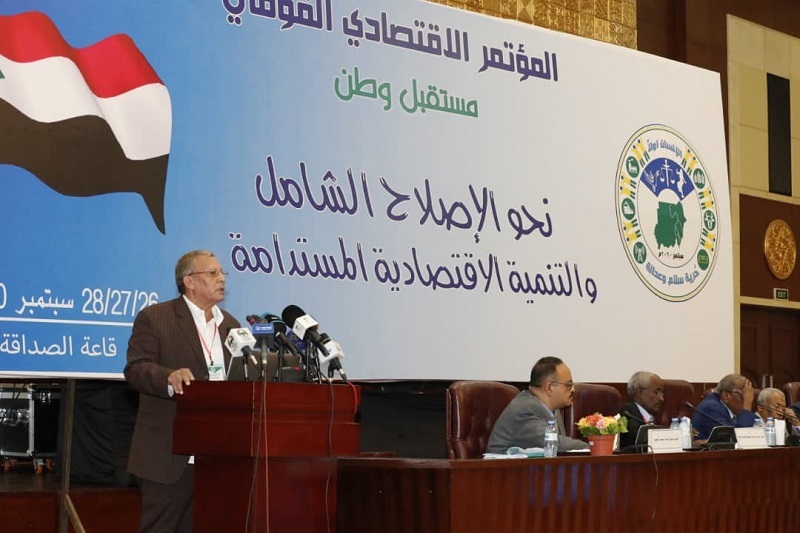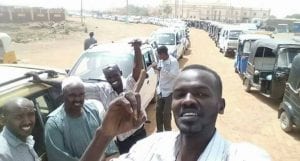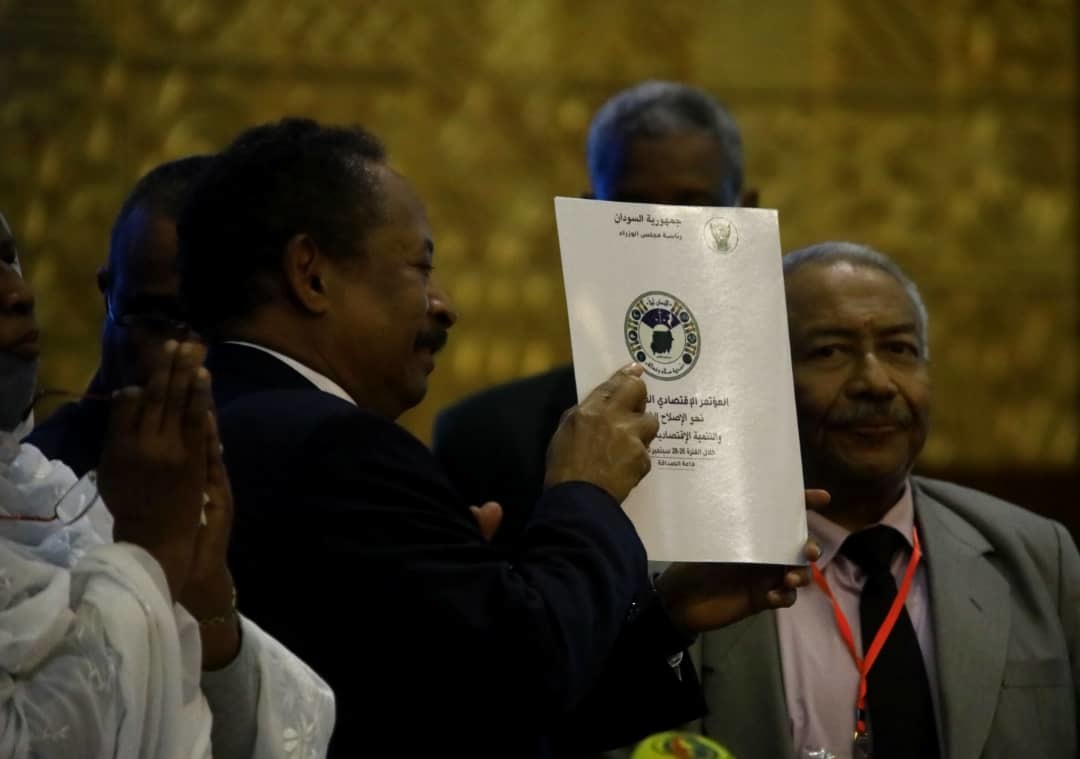Tensions run deep over economic conference recommendations
30 September 2020
“I do not agree!” shouted members of the Resistance Committee amid tensions at the National Economic Conference in Khartoum as recommendations and decisions were being read Monday evening. The conference, coined by Prime Minister Abdallah Hamdock as a “democratic exercise” to help the transitional government make major economic reforms to the country’s structure met with some criticism between representatives of the Forces of Freedom and Change (FFC) and a number of Sudanese economists and experts.
Prime Minister Hamdok praised the results of the conference, which amounted to 160 recommendations, claiming that, “they covered all tracks of the economy, comprehensive reforms and sustainable development.” The premier pledged to implement all of the recommendations and outputs of the conference after three days of convening.
The main recommendation and possibly the most contentious issue concerned cutting fuel subsidies, which is part of a reform program supported by the International Monetary Fund (IMF). The conference participants also recommended reducing imports, directing foreign exchange resources to the productive sectors and control over the sources of monetary diversification and supply rates. Some of the other key recommendations included: merging banks, the adoption of new policies to stabilise the exchange rate, confirmation over the finance ministry’s mandate over public funds as well as the revision of government companies, including those belonging to military and security institutions.
The conference also sought to reform economic laws to curb systemic corruption by establishing an anti-corruption commission and restructuring the land commission.

Foreign relations and IMF Policies
The head of Sudan’s Sovereignty Council, Lt.-Gen. Abdel Fattah al-Burhan, linked the chances of the country’s economic recovery with an improvement in foreign relations – in particular, the removal of Sudan from the US’ states sponsoring terrorism list. According to the economist Ahmed Ali al-Zein, the entire conference was more of a political exercise rather than a genuine economic forum to help the government pave relations with the international community. “Al-Burhan hinted that the conference participants should confirm the plan signed between Sudan and the International Monetary Fund (IMF),” he said. “There are two conditions for lifting US sanctions on Sudan; follow the IMF plans and normalise relations with Israel. The political forces [are keen] to follow these steps..”
Marwan Mustafa, a political activist and conference attendee agrees. “There is a clear link between the conference and fulfilling the IMF demands,” he told Ayin. “The transitional government convened this conference in order to approve specific policies [but] preparation was bad and there was a clear rush to reach preset decisions.”

Disputes and accusations
Any hopes of a smooth acceptance to policies supported by the transitional government were quickly dashed. On 27 September, the Forces of Freedom and Change (FFC) –the movement that guided Sudan’s revolution and toppled former dictator Omar al-Bashir in April last year – rejected the government’s bid to lift fuel subsidies.
Finance Ministry Undersecretary, Amna Abakar, attempted to appease the FFC by claiming authorities would “ration fuel subsidies” and continue to subsidise fuel used to produce wheat, electricity, medicine and cooking gas. Senior economist and member of the FFC’s economic committee, Kamal Karrar, accused the government of enforcing recommendations that were not agreed upon by participants. “The Ministry of Finance summarised the recommendations of the workshop. There are witnesses [and] there was no recommendation to lift fuel subsidies, we did not make this recommendation,” Karrar said. The renowned economist told Ayin the finance ministry is keen to implement its plan.
Last month, the transitional government approved an amended budget for 2020 that includes the removal of fuel subsidies, partial liberalisation of the exchange rate and an increase on the price of the customs dollar to curb imports.

Public distrust
Meanwhile, as the conference reached its conclusions earlier this week, the public remained wary of its outcome. “We need solutions not conferences,” said Khartoum taxi driver Abdel Moneim Ahmed. “I did not follow the conference sessions, nor expect anything from it,” he stressed, having spent the entire day waiting to fuel his car in vain.
Sudan declared an economic emergency recently after the Sudanese pound lost 40% of its value in one month and annual inflation jumped to a staggering 167 percent.
But not all distrust the conference’s outcome. “We must be patient with the government,” says Kamal Abdallah, an engineer, conference attendee and a committed participant in the 2019 revolution. “They are fighting 30 years of corruption and injustice. The Bashir regime created a number of corrupt financial institutions, merchants and businessmen and they still have influence in Sudan – they are trying to obstruct development. We must stand by the government side in order to fight them.”
The resistance committees, primarily made up of youth who participated in the popular uprising to topple the former government, stood against the conference’s decisions. Committee members chanted against the transitional government in Friendship Hall where the conference took place while the recommendations were being readout.
Alaa Eldeen Ahmed, one of their resistance committee leaders, threatened to demonstrate against the recommendations, specifically the lifting of subsidies. “What happened is irresponsible and not commensurate with the crisis.” Eldeen Ahmed believes the conference did not address the root causes to Sudan’s economic crisis and that the committee would use “all mechanisms available to pressure the government and stand against its decisions.”


